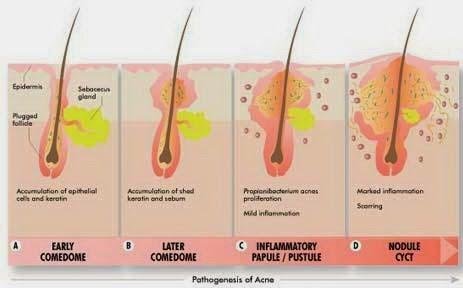symptoms of acne skin disease

Recognizing Acne Symptoms
Acne can be found anywhere on your body. It most often develops on the face, back, neck, chest, and shoulders. If you have acne, you will usually see acne that is white or black in appearance. Both blackheads and whiteheads are known as blackheads. Blackheads on the surface of the skin give them a black appearance.
Whiteheads are closed just below the surface of the skin, giving them a white appearance. While whiteheads and blackheads are the most common type of acne, other lesions can occur. Inflammatory lesions are more likely to cause scarring of the skin and include the following: small red papules, raised lumps caused by hair follicles infected with small pustules-red pimples that have pus in the ends of dense nodules, painful lumps that beneath the skin surface Cysts -infection found under the skin that contains pus and is often painful
How Is Acne Diagnosed and Treated? If you have acne symptoms, your doctor will be able to confirm the diagnosis by examining your skin. At-Home Care You can use a number of self-care activities at home to prevent acne and cleanse your acne. Home remedies for acne may include: cleansing the skin daily with mild soap to remove excess oil and dirt regularly shampoo your hair and keep it out of your face not squeezing or picking pimples, as this spreads bacteria and excess oils avoiding hats or bunches strict heads avoid touching your face using water-based makeup or labeled as "noncomedogenic" (not pore-clogging) medicine
If self-care activities do not help with your acne, there are some over-the-counter acne medications that may help. Most of these medicines contain ingredients that can help kill bacteria or dry skin. These active ingredients include: benzoyl peroxide: present in many acne and gel creams, used to dry out existing acne and prevent new sulfur: natural ingredients with distinctive odor found in lotions, cleansers and rescinool masks: less common materials used to remove dead skin cells Salicylic acid: often contained in soap and wash acne Sometimes, you may continue to experience symptoms. If this happens, you may want to seek medical advice.
Doctors can prescribe medications that can help reduce symptoms and prevent scarring. The doctor may give oral or topical antibiotics. It kills the bacteria that cause acne. Usually, antibiotics are only used for a short period of time so your body does not build resistance. Antibiotic resistance can make you susceptible to infection. Topical creams such as retinoic acid or benzoyl peroxide strength recipe are often stronger formulas than over-the-counter treatments. It works to dry the skin and reduce oil production. Women with hormonal acne can be treated with birth control pills or spironolactone.
These medicines try to regulate the hormone that causes acne. Isotretinoin (Accutane) is a vitamin A-based drug used to treat certain cases of severe nodular acne. It has serious side effects, and is only used when all other treatments fail. Additional treatments Doctors may recommend additional procedures to treat severe acne and prevent scarring. Many of these jobs by removing damaged skin